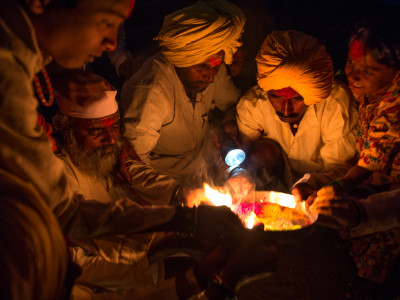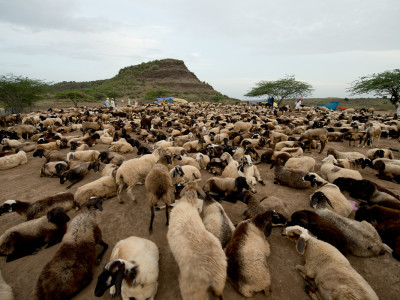],[https://www.peepli.org/wp-content/uploads/2015/05/KalyanVarma_4126228-1000x667.jpg,(large)])
“I want to become a pilot. I’ll fly a plane one day.”
Shani looks up from his Samsung phone, on which a music video is playing, to tell me of his dream. He is 14, and tends sheep like his father Mahendra and the rest of the Dhangars.
In that group of men and boys clad in traditional white kurta and dhoti, Shani stands out in denim jeans and checked shirt. His head seems permanently attached to a peaked cap with ‘Armani’ on it – I’ve never seen him without, even when he wanders off to a nearby stream for a bath.
Shani’s dream formed when he was in school, but Mahendra pulled him out earlier this year and got him married. His bride is 10 years old, and lives with her parents in another village.
Mahendra’s attitude to education is wary – it can be a double-edged sword, he thinks. He is totally at ease with the fact that he has never been to school, and points out that he has all the knowledge and skills to thrive.
It is emblematic of the duality of their thinking. The Dhangars are content that they know how to live their un-rooted, migratory life, but equally they believe education is necessary and their young should be free to choose their own path. Almost all their children have been sent to school at some point.
Yet, there are reservations. “Hum idhar bhi nahi aur udhar bhi nahi,” (We are neither here nor there) says Mahendra.
The ambivalence is best explained by the story of Surendra, the eldest son of Mahendra’s brother. Bapu sent him to school, where Surendra studied till class 12, which for the Dhangars is a milestone, as a degree would be for the city-bred. He then began to look for a job.
In these rural regions, the only ‘respectable’ job is a clerkship in a government office. A few thousand apply for every vacancy. A tout told Surendra the job could be his on payment of a ‘fee’ of Rs 5 lakh – big money by anyone’s standards.
Bapu sold half his sheep and raised the rest through a loan obtained at exorbitant interest. Surendra paid the money and the tout promptly vanished, leaving him with neither employment nor money.
“Because he is educated, my son has no respect for what we do,” Bapu says. “He has been away from home since the age of six, and has lost the art of managing sheep. He lives in town now, wasting his time, and I have to support his expensive lifestyle.”
Hum idhar bhi nahin aur udhar bhi nahin…
Mahendra is determined that his son will not be left in similar limbo – so educated he cannot earn a living through traditional means, yet not qualified enough to get a regular job.
“He is a slow kid, and I’d rather have him grow into a secure livelihood,” Mahendra says, very matter of fact. “He will make more money here, living this life, than he can ever make in a government job.”
Mahendra’s oldest daughter is thus the flag-bearer for education – and it turns out he can’t remember her name.
His two little daughters, Julie and Jayashree, are with him in camp. When I ask him about his eldest he pauses, trying hard to recall her name.
“We call her Najuk, the delicate one,” he tells me. The school has given her an ‘official’ name, but he can never remember it. He calls out to a cousin who, it turns out, can’t immediately recall the name either.
“Misha!” he tells me with an air of triumph. “That’s right, Misha. She is in class 10, and has gotten a scholarship from the government.”
The clan is of the opinion that it is time she was married off, but Mahendra will have none of it.
“If Najuk wants to study further, go beyond class 12, I am going to give her that chance,” he tells me.
“I know she will make me proud one day.”






